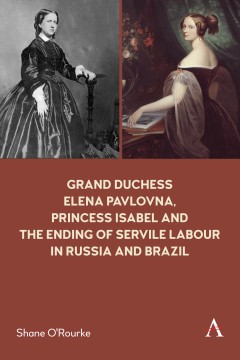Grand Duchess Elena Pavlovna, Princess Isabel and the Ending of Servile Labour in Russia and Brazil
By Shane O'Rourke
Other Formats Available:
- About This Book
- Reviews
- Author Information
- Series
- Table of Contents
- Links
- Podcasts
About This Book
Grand Duchess Elena Pavlovna and Princess Isabel were two of the most remarkable women of the nineteenth century; both are largely unknown in the English-speaking world. Elena Pavlovna was a German princess from the Kingdom of Wurttemburg who was selected to be the wife of Grand Duke Mikhail, the brother of Emperors Alexander I and Nicholas I. Princess Isabel was the daughter of the Brazilian emperor Dom Pedro II and heir to the throne. Both women were major players in the politics of emancipation in Russia in 1861 and in Brazil in 1888, respectively. Like many women, their political activities have been marginalized or completely written out of the historical record. This book chronicles the political lives of these two women, culminating in two of the most momentous emancipations of the nineteenth century. It does so in a way that sets the two women in the context of their societies. These societies were servile societies in the full sense of this phrase. Russia was the largest servile society in the world with over 40 million serfs at the time of emancipation while Brazil was the first slave society in the Americas and the last to free its slaves.
The book emphasizes that the freeing of serfs in Russia and slaves in Brazil was part of the great wave of emancipations that began with the French Revolution. When that wave finally receded servile labor had been swept away from most countries in the world, including France (1789), Haiti (1793), Prussia (1807), the British Empire (1833), the Austrian Empire (1848), the Russian Empire (1861), the United States (1865), and ending with the freeing of slaves in Brazil in 1888. Too often, emancipation is looked at purely from a national view or one that is confined to the English-speaking world. Yet even from this truncated list it is clear that emancipation was a truly transnational phenomenon.
The book adopts an explicitly comparative approach. By detailing emancipation in the Russian and Brazilian empires, this book offers a broader understanding of that process, showing what they had in common as well as what differentiated them. Both empires were monarchies in which the emperors ruled as well as reigned, both excluded women from any political role and both were servile societies. Without denying the importance of the struggles of the oppressed themselves for freedom or the impact of economic changes, this book prioritizes high politics as an essential component of Monarchy, gender roles, and emancipation converged in the persons of Grand Duchess Elena Pavlovna and Princess Isabel in ways that had a decisive impact on the course of emancipation and the form that it took.
Reviews
‘It is a highly original, ingenious and subtle analysis of the emancipation of serfs/slaves in Russia and Brazil, looked at through the optic of two royal princesses, Elena and Isabel. It explores the largely unappreciated role played by these two women in bringing about the end of servile labour, a role exercised through personal influence and outside the male realm of politics. The study is deeply researched, and the author’s command of Russian, Portuguese and French sources is impressive’— Professor Steve Smith, All Souls College, University of Oxford, UK.
‘A fascinating and original comparison, packed with detail about the lives of two influential royal women, and properly insistent on the importance of politics in the process of peasant emancipation’— Simon Dixon, Sir Bernard Pares Professor of Russian History, UCL; General Editor, Slavonic and East European Review.
‘It is a well-crafted work – nicely balanced, using specific evidence to move towards a more general explanation of emancipation – AND the role of two remarkable women in the process’— Professor James Walvin, Department of History, University of York, UK.
Author Information
Dr. Shane O’Rourke is a senior lecturer in the Department of History at the University of York.
Series
Anthem Impact
Anthem Brazilian Studies
Table of Contents
Preface; Introduction; 1. Empires of Servility; 2. Grand Duchess Elena Pavlovna and the Emancipation of the Serfs; 3. Princess Isabel and the Abolition of Slavery; Conclusion; Bibliography; Index
Links
Stay Updated
Information
Latest Tweets



